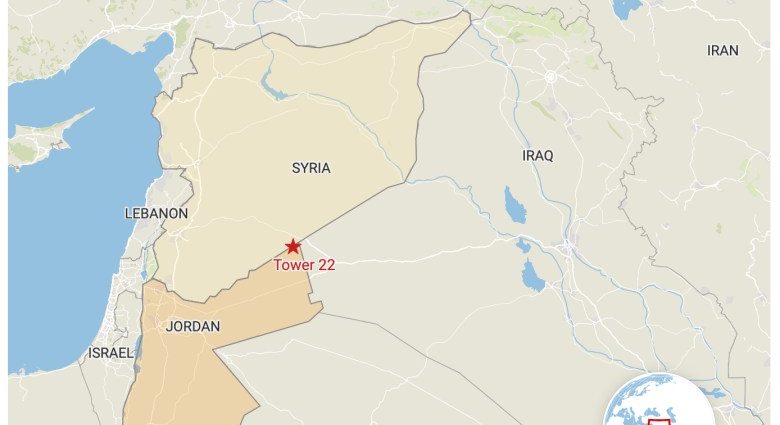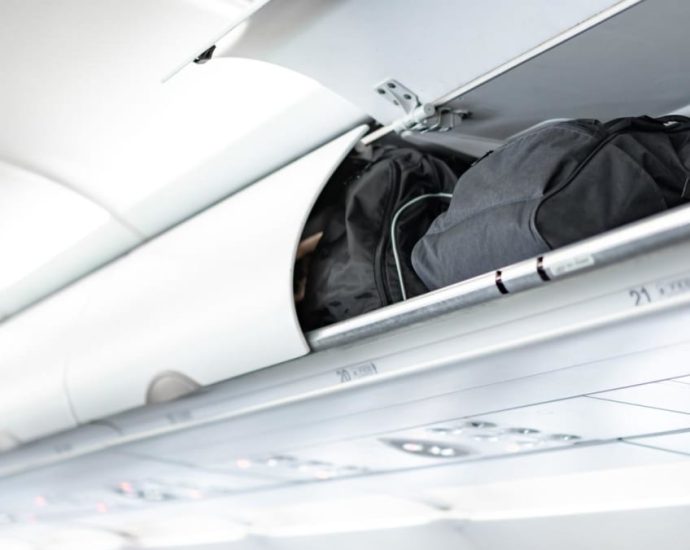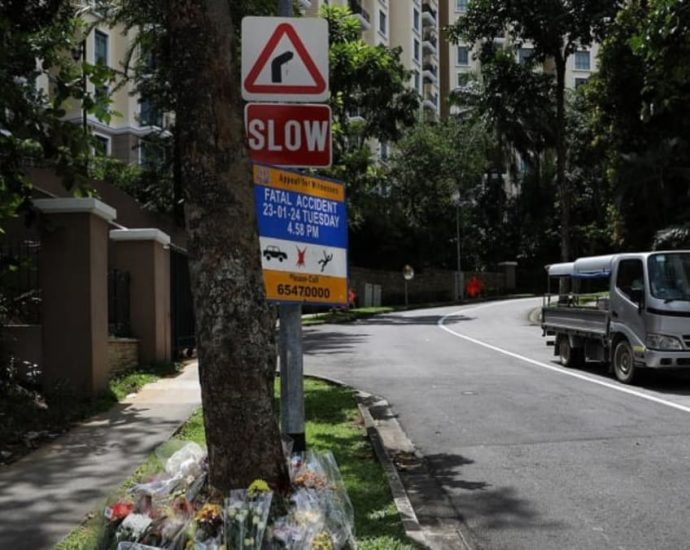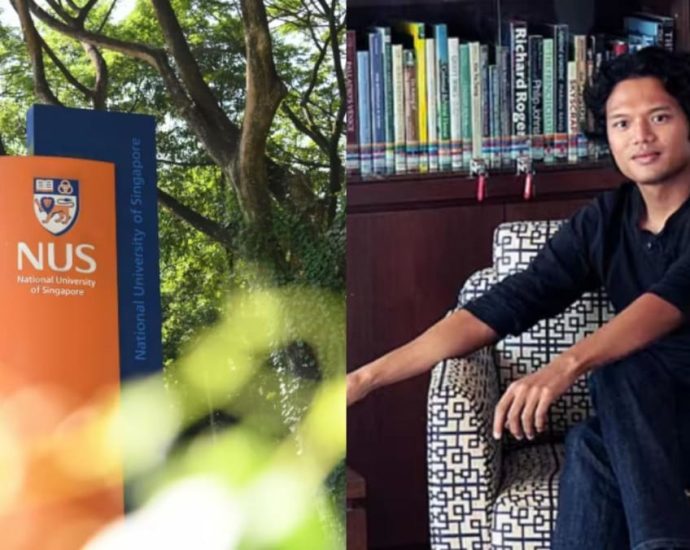Biden’s Iran dilemma deepens with killer drone hit – Asia Times
A drone attack that killed three American troops and wounded at least 34 more at a base in Jordan has increased fears of a widening conflict in the Middle East – and the possibility that the US may be further drawn into the fighting.
President Joe Biden vowed to respond to the assault, blaming Iran-backed militias for the first US military casualties in months of such strikes in the region.
But to what extent was Iran involved? And what happens next? The Conversation turned to Sara Harmouch, an expert on asymmetric warfare and militant groups in the Middle East, to answer these and other questions.
What do we know about the group that claimed responsibility?
Al-Muqawama al-Islamiyah fi al-Iraq, which translates as the Islamic Resistance in Iraq, has claimed responsibility for the drone attack.
However, the Islamic Resistance in Iraq is not a single group per se. Rather, it is a term used to describe an umbrella organization, which, since around 2020, has included various Iran-backed militias in the region.
Initially, the Islamic Resistance in Iraq emerged as a response to foreign military presence and political interventions, especially after the 2003 US-led invasion of Iraq. The Islamic Resistance in Iraq acted as a collective term for pro-Tehran Iraqi militias, allowing them to launch attacks under a single banner. Over time, it evolved to become a front for Iran-backed militias operating beyond Iraq, including those in Syria and Lebanon.
Today, the Islamic Resistance in Iraq operates as a cohesive force rather than as a singular entity – that is to say, as a network its objectives often align with Iran’s goal of preserving its influence across the region, but on a national level the groups have their distinct agendas.
The collective is notorious for its staunch anti-US posture and dynamic military campaigns, such as a recent two-day drone operation targeting American forces at an Iraqi airbase.
Operating under this one banner of Islamic Resistance, these militias effectively conceal the identities of the actual perpetrators in their operations. This was seen in the deadly January 28, 2024, attack on Tower 22, a US military base in Jordan. Although it is evident that an Iranian-supported militia orchestrated the drone assault, pinpointing the specific faction within this broad coalition remains elusive.
This deliberate strategy hinders direct attribution and poses challenges for countries attempting to identify and retaliate against the precise culprits.
What do they hope to achieve in attacking a US target?
Iranian-backed militias have been intensifying attacks on US forces in recent months in response to American support for Israel in the Israel-Hamas conflict, and also to assert regional influence.
Since the beginning of the conflict in October 2023, Iranian-backed militias have repeatedly struck American military bases in Iraq and Syria, recently expanding their attacks to include northeastern Jordan near the Syrian border.
The deadly assault on January 28 marks a significant escalation, though – it is the first instance during the Israel-Hamas war that American troops have been killed.

The attack in Jordan forms part of a strategy by Iranian-backed militias to counter Washington’s support for Israel in the Gaza conflict. But it is also aimed at advancing a wider goal of pushing US forces out of the Middle East entirely.
By coordinating attacks under the Islamic Resistance in Iraq, these groups are trying to display a unified stance against US interests and policy, showcasing their collective strength and strategic alignment across the region.
What role did Iran have in the attack?
Iran has officially denied any involvement in the drone strike. But the Islamic Resistance in Iraq is known to be part of the networks of militia groups that Tehran supports.
Iran, through the Islamic Revolutionary Guard Corps’ Quds Force, has provided such militias with money, weapons and training. However, the extent of Iran’s command and coordination in specific incidents like the Jordan attack remains unclear. At this stage, more concrete evidence is necessary to firmly implicate Iran.
As Iran expert Nakissa Jahanbani and I recently explained in an article for The Conversation, Iran’s strategy in the region involves supporting and funding militia groups while granting them a degree of autonomy. By doing so, Iran maintains plausible deniability when it comes to attacks carried out by its proxies.
So while Iran’s direct involvement in the attack has not been definitively established, Tehran’s long-standing support of groups like the Islamic Resistance in Iraq is well documented, playing a significant role in the regional conflict dynamics and geopolitical strategies.
What options does the US have to respond?
It isn’t clear how the US intends to respond to the attack. The Biden administration faces complex dynamics when it comes to responding to attacks linked to Iranian-backed militias.
While a forceful military strike is an option that the Biden administration appears to be looking at, targeting Iran directly on its own soil is fraught with risks and may be seen as a step too far.

Even when targeting Iranian interests or personnel, such as the assassination of Quds Force General Qassem Soleimani, the US has conducted these actions outside Iranian territory.
Iran’s denial of direct involvement in the attack further complicates the situation and makes it less likely that the US attacks Iran in retaliatory strikes.
But adopting a targeted approach, such as striking militia leaders outside of Iran, raises questions about the effectiveness of US tactics in deterring Iran and its proxies.
This strategy has been employed in the past, yet it has not significantly curbed Iran’s or its proxies’ aggressive actions. The concern is that while such strikes are precise, they may not be enough to deter ongoing or future attacks.
The key to the strategy’s success may rest in identifying the most influential factors, or “centers of gravity,” that can effectively influence Iran’s behavior. This means determining key leaders, critical infrastructure or economic assets, which, if killed, destroyed or seized, could substantially alter Iran’s decision-making or operational capabilities.
The Biden administration’s need to balance a strong response with the geopolitical consequences highlights the difficulties of navigating a tense and evolving situation.
How might the attack affect the wider Middle East conflict?
How the US responds could reshape the Middle East’s geopolitical landscape and influence the dynamics of proxy warfare in the region.
A strong military response from Washington might deter Iranian-backed militias from future attacks, but it could also provoke them into taking more aggressive actions.
In the short term, any US retaliation – especially if it targets Iranian interests directly – could escalate tensions in the region.
It could also exacerbate the cycle of tit-for-tat strikes between the US and Iranian-backed forces, increasing the risk of a broader regional conflict.
And given that the attack’s pretext involves the Israel-Hamas war, any US response could indirectly affect the course of that conflict, impacting future diplomatic efforts and the regional balance of power.
Sara Harmouch is PhD Candidate, School of Public Affairs, American University
This article is republished from The Conversation under a Creative Commons license. Read the original article.
Man arrested for ‘accidentally’ shooting another driver
PUBLISHED : 30 Jan 2024 at 12:14

A man was hit in the leg by a stray bullet while sitting in his vehicle in a Bangkok car park on Monday night. Police subsequently arrested the driver of another vehicle who admitted his gun “accidentally discharged”.
Voraset Klueniam, 53, reported the incident to Thong Lor police about 8.50pm.
Mr Voraset said he was sitting in his vehicle in a car parking area on Rama 4 Road when he was inexplicably hit in the right leg by a bullet. The bullet came from outside his car, but he did not know who fired it or which direction it came from.
He had been stopped in the car park at the Hinonmachi project near Big C’s Rama 4 branch in Klong Tan area of Klong Toey district. Police said they examined security camera footage and inspected other vehicles in the area. They found a Toyota Fortuner parked in another zone with a bullet hole in the driver’s door.
They saw a man near the vehicle acting in a furtive manner, and asked him about the bullet hole in the door.
He was Amphorn Chunate, the Fortuner driver, and he was subsequently arrested.
Mr Amphorn, 53, admitted the bullet accidentally discharged from his gun. Police said they found a Colt pistol and 14 rounds in a plastic bag inside the vehicle.
He was detained for legal action, police said.
Man jailed after stealing bag on Cambodia Airways flight while being watched by Singapore police officers

POLICE WATCHING HIS EVERY MOVE
On the morning of Dec 15, 2023, Yi and a few Singapore Police Force officers were on a Cambodia Airways flight heading to Singapore from Cambodia, where Yi had worked as a businessman for about four years.
Yi, Assistant Superintendent of Police (ASP) Lee Jun Long and the victim, another Chinese national, were seated within rows of each other.
Yi opened the overhead compartment for his row before glancing at other passengers and noting that they were asleep.
He slipped a haversack from the connected overhead compartment above the next row and took it to an empty seat at the back of the plane to rummage through it.
Noting nothing of interest, he returned the bag but stole a second bag. Uninterested in its contents, Yi returned the second bag.
At this point, his actions had aroused the attention of ASP Lee, who related his observations to two fellow police officers on the same flight. The trio observed Yi closely.
Yi then moved towards the victim, after noticing that the man was not paying attention to his belongings.
Opening the compartment above the victim’s head, he removed a leather bag that contained two wallets with S$250 cash, three bank cards, and two laptops.
He took the bag to an empty seat at the front of the plane to go through it, all while watched by three police officers.
ASP Lee approached Yi and tapped him on the shoulder, asking him what he was doing and whether the bag was his.
Yi lied that the bag was his, but the officer warned him to tell the truth as he noticed that the accused had taken two bags earlier. Yi admitted the bag was not his, but claimed that he was searching for his own bag, as he had forgotten where it was.
ASP Lee held up the leather bag to ask the passengers who it belonged to, and the victim shouted that the bag was his.
The police officer asked Yi to produce his passport, and the accused headed to his bag, which was above his seat.
“The accused was not able to explain why he was now able to find his bag, which contradicted his earlier explanation that he was searching for his bag as he could not remember where it was,” Deputy Public Prosecutor Dan Pan told the court.
Yi was arrested when the plane landed at Changi Airport and charged the next day.
He did not admit to his offences during investigations and insisted that he had been trying to search for his bag as he could not remember where he had placed it.
OFFENCE DIFFICULT TO DETECT
Arguing for seven to eight months’ jail for Yi, Mr Pan pointed out that Yi’s offence was clearly premeditated and that he had targeted victims he noticed were asleep or not paying attention.
Victims in such cases are highly vulnerable as they are unable to keep constant watch of their belongings, the DPP added. Such offences are hard to detect and would impact Singapore’s reputation as a safe country, Mr Pan said.
The prosecutor cited 43 cases of aircraft theft in 2012 and 35 cases in 2013 – a jump from 2011, when only one theft case on board aircraft was reported.
Mr Pan argued that Yi’s plea of guilt was not indicative of remorse as he had been caught red-handed with overwhelming evidence against him. Yi had also been uncooperative during investigations, the prosecution noted.
Speaking through a Mandarin interpreter, Yi pleaded for proceedings to be completed “as soon as possible” and requested for a phone call to his family in China.
“They did not know that I was in prison and Chinese New Year eve is drawing near as well,” Yi said.
“(My family) thought I was still in Cambodia and have not received any news from me and they are concerned for my safety, whether I’m being kidnapped or killed,” he added.
District Judge Chay Yuen Fatt considered the factors highlighted by the prosecution, including the prevalence of such offences.
Considering the difficulty of detecting such offences, it was “entirely fortuitous” that the police officers were on board the plane and vigilant enough to detect Yi’s crimes, the judge said.
For theft, Yi could have been jailed for up to three years, fined, or both.
Trumpâs veep should be assassination insurance – Asia Times
In recent weeks, former US president Donald Trump repeatedly has indicated publicly that he is already thinking about choosing the person to run with him as the Republican nominee for vice-president.
During the coming months, many people will urge Trump to choose a “moderate” running mate in hopes of enhancing his electoral prospects and those of other Republican candidates.
However, it is unusually important that Trump pick a vice-presidential candidate less as a running mate than as a potential successor, not merely because of Trump’s age, but also in order to discourage Trump’s assassination and – if worse comes to worst – to help Trump’s “America First” movement to survive him.
That Trump is at unusually high risk of assassination seems self-evident. Not since Abraham Lincoln has an American president or major-party presidential candidate been so widely demonized as Donald Trump, who is now vilified by US ruling elites, including the sitting president, members of Congress, academics and journalists not merely as leading but as being, in person, an existential threat to what they call “our democracy.”
Some of Trump’s supporters have warned publicly of this risk. Tucker Carlson, interviewing Trump on August 23, asked him why some of the millions who hate him viscerally would not assassinate him rather than allow him to return to the presidency. When Trump evaded that question, Carlson asked it again, and Trump evaded it again.
A week later, Carlson, appearing on Adam Carolla’s weekly podcast, opined that “we are speeding toward assassination” of Trump. After The New York Times, on November 30, published an opinion piece by neoconservative Robert Kagan titled “A Trump dictatorship is increasingly inevitable,” pro-Trump congressman Matt Gaetz posted on X (formerly Twitter): “They’re obviously green-lighting assassination.”
In recent decades, polls have repeatedly shown that most Americans doubt the official US government account of president John F Kennedy’s assassination. Many suspect that persons currently or formerly in the service of US internal security or intelligence agencies may have participated in it.
Such persons – including Warren Commissioner and former Central Intelligence Agency director Alan Dulles – plainly participated in covering up aspects of the assassination. Moreover, the executive branch of the US government continues not to release numerous documents bearing on the Kennedy assassination, notwithstanding repeated statutory mandates to release them. Sixty years later, who killed JFK remains uncertain.
Under these circumstances, it seems imprudent to assume that the set of potential Trump assassins excludes current or former employees or contractors of US internal security agencies and of such agencies of European states whose elites fear Trump – and their own swelling populist-nationalist movements – no less than do US elites.
It also seems imprudent to expect Trump’s supporters not to suspect the “deep state” of involvement in any assassination of Trump, regardless of what may be said by government and mass media, neither of which Trump’s supporters trust. Consequently, the potential consequences of Trump’s assassination include nastiness that, for now, seems better imagined than discussed.
Although some political assassins are nutters whom nothing can deter, some are rational and can be deterred.
Consequently, the risk of a Trump assassination may be substantially reduced if Trump’s undoubted successor is clearly no less committed than Trump to the two core elements of Trump’s “America First” agenda: (1) replacement of international free trade with national economic autonomy insofar as feasible; and (2) an end to wage-lowering immigration from poor countries, including an end to asylum and illegal immigration and restriction of legal immigration.
There are many prospective vice-presidential candidates who could provide effective life insurance for Trump, and effective insurance against domestic violence for the US. Which of them might best enhance Trump’s electoral prospects or best assist Trump as vice-president is for Trump to decide.
However, to provide such insurance, Trump’s veep pick must clearly be no less hostile than is Trump to free trade and immigration that enrich US elites by impoverishing US workers.
Moreover, a veep who “out-Trumps Trump” might help convey to US elites a reality that they prefer to ignore. Trump is no longer the most populist of well-known US populists. He is becoming a moderate in the movement he unleashed.
Trump loves winning, and against the Grim Reaper, no one wins. However, those who have a posterity do not wholly lose, and that Trump can deal with his mortality is suggested by his having troubled to raise five children.
In designating a veep, he might best be guided by them and his 10 grandchildren, trusting in their desire to keep him here with them until, in the fullness of time, one Big Mac too many raises him to join George Washington, Lincoln, and Franklin Delano Roosevelt.
Wife-sharing rape ring: Last man gets jail and caning for raping co-conspirator’s wife, to appeal

He then testified against O in O’s trial, sharing how he met O in an online message thread titled Wife Fantasy on Sammyboy Forum in April 2010.
He said he suspected his wife was cheating on him after he had cheated on her. Acting on suggestions from people online, he looked for people to help test his wife’s loyalty to him and settled on O.
According to J, O began having an affair with J’s wife secretly, which J soon discovered by snooping on his wife’s chatlogs.
After this, he drugged his wife on their third wedding anniversary in 2011 and invited O over to rape her.
It was only in January 2020 that J’s wife discovered the offences. She found explicit photos of herself in her husband’s phone that suggested other men were involved.
JUDGE’S REMARKS
Justice Mavis Chionh said the victim suffered grave trauma after finding out that she had been drugged and raped on her matrimonial bed.
She was left hurt, angry, disappointed and overwhelmed when she first discovered the offences against her, said the judge.
The victim felt so upset that she thought she would be better off dead.
Justice Chionh said the defence’s attempts to cast O as a “hapless follower” who somehow got caught up in J’s machinations were “without merit”.
The victim was unconscious and blindfolded at the time and was thus clearly a vulnerable victim, said the judge.
Her personal sense of security and safety were “destroyed”, and the offence violated the sanctuary she called home, said Justice Chionh.
She said it was irrelevant that J gave O access to J’s residence.
She cited another judge, who said that the fact that a victim’s husband abets a rapist’s entry into the victim’s matrimonial home is not just a neutral factor, it is a “substantially aggravating factor” that increases the sense of betrayal that would have been felt by the victim.
Other than O and J, there were another five men involved in the wider wife-sharing ring.
Four of them – K, L, M and N, were sentenced in November 2022, receiving jail terms of between 13-and-a-half years and 22 years. Three of them received 20 strokes of the cane, while the fourth did not as he was above 50.
The fifth man, P, was sentenced in January 2022.
China Evergrande liquidation is no Lehman moment – Asia Times
On Monday, many investors couldn’t help but wonder if the liquidation order China Evergrande Group received from a Hong Kong court was a “Lehman moment.”
Not quite. More likely, the milestone here is of a very different nature: a move that catalyzes Beijing to get serious about ending its property crisis once and for all.
It matters that neither markets in Shanghai nor Hong Kong tanked on the news. At the same time, that hardly means Chinese leader Xi Jinping’s Communist Party is out of the woods with global investors.
Staving off a deeper selloff in mainland stocks requires bold, urgent and transparent action by Xi’s government to treat the underlying cracks in Asia’s biggest economy, not just the symptoms. In recent days, the People’s Bank of China moved to address the latter concerns. It’s lowering the reserve requirement ratio (RRR) by 50 basis points, effective February 5.
This “quite unprecedented” step should “free up around 1 trillion yuan (US$140 billion) in liquidity, which will be put toward supporting new loan growth,” says economist Carlos Casanova at Union Bancaire Privée.
The PBOC’s “haste in announcing the cut denotes urgency on behalf of policymakers, following an extraordinary rout in Chinese equities in January,” Casanova adds.
It’s far more important, though, that Xi’s team pivots immediately from prioritizing security to economic upgrades. Over the last two years, Xi’s team has ricocheted from pledge to pledge to devise a strategy to take toxic assets off property developers’ balance sheets and sharply reduce their ranks.
One possibility about which investors have long buzzed is Beijing adopting a Resolution Trust Company-like model the US used to address the savings and loan crisis of the 1980s. That could avoid a Japan-like lost decade as a sector that can generate as much as a quarter of China’s GDP gets a new lease on life.
Doing so would afford Xi’s reform team an opportunity to confound the naysayers and reinvigorate China Inc. It would make good on Xi’s pledges to prioritize the quality of growth over the quantity. And it would change the narrative of China repeating the mistakes Japan made in the 1990s amid its bad loan crisis.
Since March, Xi has entrusted the cleanup to his new premier, Li Qiang. The overarching goal has been for financial institutions to try their hand at repairing balance sheets themselves without giant public bailouts that might create fresh “moral hazards.”
Yet a lack of quantifiable progress in addressing the crisis caused trillions of dollars of capital to flee Chinese stocks in 2023. Chinese stocks have lost over $6 trillion in the last three years.

Monday’s court ruling was handed down by Judge Linda Chan following a June 2022 lawsuit by an investor in an Evergrande unit. Repeatedly, Chan delayed proceedings to afford Evergrande time to cement a restructuring deal. In her ruling, Chan cited a “lack of progress on the part of the company putting forward a viable restructuring proposal” along with Evergrande’s “insolvency.”
Chan told a packed courtroom “I consider that it is appropriate for the court to make a winding-up order against the company, and I so order a winding-up order.”
The next step is for the court to settle on a liquidator to manage Evergrande and then to figure out how to divvy up the developer’s interests, most of them in the mainland. As of now, its roughly 1.74 trillion yuan ($242 billion) of assets are exceeded by 2.39 trillion yuan ($333 billion) of liabilities.
Questions abound in terms of what all this means for bondholders. An obvious one is what pushback the Hong Kong ruling might receive from Beijing. Many investors have a hard time believing that the court would have acted without alerting Beijing ahead of time. The perception for now is that the court had Beijing’s tacit blessing.
Still, it’s unclear how China will proceed. Since so many Evergrande projects are operated locally by mainland units, it’s unclear how far Hong Kong’s jurisdiction extends into Xi’s economy. And it’s not as if construction projects entailing the completion of homes and flats are about to stop on a dime.
In fact, Beijing would be wise to provide the liquidity needed to allow other developers to finish what they have sold. Doing so could have a positive effect on domestic confidence, both for businesses and households, and support GDP.
Of course, all this, analyst Ken Cheung Kin Tai at Mizuho Bank explains in a note, could spook investors worried about China’s property sector more than it comforts them. Indeed, this Evergrande liquidation “milestone” might be a price-clearing event that further shakes investor confidence with a bottom that has yet to be found for property and asset values.
The silver lining, though, from the Evergrande “shock” is how Monday’s events signal Xi’s economic team is rolling up its sleeves to end China’s dueling debt crises.
The property meltdown is the immediate pressure point as other giant developers like Country Garden Holdings hit a wall. At times in 2023, Allianz, Apollo Asset Management, Banque Lombard Odier, BlackRock, Deutsche Bank, Fidelity, HSBC, JPMorgan Chase, NinetyOne UK and a who’s-who of other global institutions had Country Garden exposure.
The last thing Xi wants in 2024, with US elections looming, is for China to be blamed for Lehman-ing a global economy already on edge.
As analyst Rosealea Yao at Gavekal Dragonomics notes, Xi’s reformers “have not yet abandoned the aim to reduce the economy’s reliance on property over the long term, meaning some aggressive stimulus options are still off the table.”
The pros and cons of this balancing act are playing out in real-time. In 2023, for example, Beijing mulled rollbacks of other housing purchase restrictions in first-tier cities. The strategy: do enough to stabilize property sales without incentivizing bad behavior.

One oft-cited risk here is avoiding Japan’s lost-decade troubles. Too often, China, like Japan, “fails to get the most from its immense investments,” says economist Richard Katz, author of “The Contest for Japan’s Economic Future.”
A big factor, Katz says, is the continued dominance of state-owned enterprises. Compared to private companies, SOEs get about only half as much output for every yuan they invest.
“In the 1990s,” Katz says, “Beijing greatly reduced the role of SOEs, but they’ve rebounded under Xi. Worse yet, to prop up economic demand in the face of weak consumer income, China keeps pouring money into infrastructure whether or not it is still needed.”
Katz says that “while much is marvelous, like the cell phone towers one sees all over rural mountaintops, an increasing share resembles Japan’s famous ‘bridges to nowhere.’ The same goes for all the money poured into new housing, much of it financed with debt, still vacant, and bought by citizens hoping to gain from a price hike – as in Japan’s 1980s property bubble.”
The upshot, Katz says, is that “back in 1995, China could increase its GDP by 1% if it hiked its stock of capital by 2%. Now, to get the same 1% expansion of GDP, it has to hike its capital stock by 6%. Consequently, just to maintain the same rate of GDP growth, it has to devote ever-larger shares of annual GDP to investment.” This, Katz adds, “is unsustainable and is a big factor in why China is in such trouble today.”
Another vital step is diversifying growth engines. Since March, Premier Li has been focused on creating deeper and more trusted capital markets so that households invest in stocks and bonds in addition to property. Li also has been charged with building broader social safety nets to encourage household consumption over savings.
The other gaping crack in China’s financial system is local government finances. Just as Beijing needs to cleanse property developers’ balance sheets, it must devise credible mechanisms to prevent a $9 trillion mountain of local government financing vehicle (LGFV) debt from collapsing.
“LGFVs and local governments are likely to remain under financial pressure as a result of the ongoing weakness in property,” says Jeremy Zook, lead China analyst at Fitch Ratings. “Policy support related to LGFVs is likely to remain targeted to addressing refinancing risks to preserve financial stability. In this baseline, LGFV debt is likely to migrate gradually onto the sovereign balance sheet, as local governments issue refinancing bonds to manage LGFV risks.”
UBP’s Casanova adds that it is safe to assume that policy easing will continue to be “desperately needed to ensure the economic recovery is secured in 2024. However, the onus will be on fiscal. Due to pressures on the foreign exchange front and concerns around the sustainability of LGFV debt, we think that monetary policy support will likely take a background role in 2024” to policy reforms.
The good news, Fitch points out in a recent report, is that recent events have “further increased refinancing pressure on the LGFVs over the long term by widening the duration mismatches because their project durations are typically between three and five years.”
Fitch adds that “transaction costs could also add up if LGFVs issue more frequently with shorter-term bonds to refinance long-term debt, given that 364-day bonds currently account for less than 3% of LGFVs’ outstanding offshore US dollar bonds.”
A big reason foreign investors debate whether China is now “uninvestable” is chronic opacity at the highest levels of government.
It’s a problem that “one knows how” Beijing plans to “rebalance its economy” after all too many “botched rescues,” says economist Nicholas Spiro at Lauressa Advisory. It’s high time, Spiro notes, that China tackles its “deep-seated structural problems” transparently and credibly.
Doing just that could dovetail with expected shifts in global interest rates. Case in point: how rate cuts by the US Federal Reserve versus a stable yuan might increase demand for Chinese debt.
“With US rates off their peak, we expect foreign inflows into China bonds to continue next year,” Ju Wang, rate strategist at BNP Paribas SA.
Rescue efforts appear to be accelerating in sync with signs of structural reforms. Beijing is moving to limit short selling, officially this time. This week, the China Securities Regulatory Commission said there will be a “complete suspension of the lending of restricted stocks” and that it will limit the “efficiency of securities lending” beginning March 18.
This could mean further limitations on securities lending to come. The measures, the CSRC said, are designed to “create a fairer market order.”

Meanwhile, state-run Xinhua Finance News reports that Beijing is working to merge three of China’s largest bad debt managers into the sovereign wealth fund China Investment Corp.
It would be its own milestone for financial institutions reform as China Cinda Asset Management, China Orient Asset Management and China Great Wall Asset Management are incorporated into CIC.
Xinhua noted that the transaction would take place in the “near future,” a move akin to how China acted to stabilize bad debt managers in 1999 in the aftermath of the Asian financial crisis.
Yet it is the idea that China is finally serious about fixing its property sector and reining in local government borrowing that’s getting the headlines this week. Xi and Li would be wise to lean into a news cycle that could help change the longer-term narrative toward China doing what it takes to get back on its feet.
Follow William Pesek on X at @WilliamPesek
Actor Zhang Zetong, who plays a time traveller in new show, wants to travel to the future to see how the world ends

YOU’VE RECENTLY BEEN POSTING MORE ONLINE CONTENT LIKE FOOD VLOGS AND GADGET REVIEWS. IT LOOKS LIKE YOU’VE BEEN MAKING AN EFFORT TO CONNECT WITH YOUR FOLLOWERS ONLINE. DO YOU THINK IT’S IMPORTANT FOR AN ACTOR TO CREATE CONTENT TO BE POPULAR THESE DAYS – IS ACTING NOT ENOUGH ANYMORE?
To answer that straight out, I say yes. I’d say that it’s very important and right now, the good thing about social media is that we are able to take the initiative to do what we want. It’s really like a blank piece of paper where you can do whatever you want to do, create photos, avant garde fashion or short content. I feel like with the advancement of social media, everyone can really rise up and engage as long as they have great content.
So with regards to acting in Singapore, yes, (content creation is important). I feel that it depends on what you want at the end of the day. For me, what I’m pursuing is that I want to expand on the facades that I have besides acting. I hope that with my free time, while not disturbing my craft of acting, I will be able to craft more entertaining content for whoever is out there.
YOU SPOKE ABOUT VENTURING INTO SOCIAL MEDIA DURING OUR LAST INTERVIEW AND IT’S GREAT TO SEE YOU BEING MORE ACTIVE ONLINE THESE DAYS. HAVE YOU FOUND YOUR NICHE?
I think that’s the million dollar question everyone asks. Right now, definitely not. The only niche I have is ‘Zhang Zetong’. Besides that, I think I’m still all over the place, but I feel that I’m cherishing this time where I put up whatever interests me without marrying myself to a niche yet.
The gurus online say you have to have a niche but for me, it’s like I don’t want to box myself up with a singular niche first. Food is something I’m interested in – I just ask myself what kinda content I want to do while still enjoying myself. I genuinely want to find nice food or different places, or new gadgets that I would buy and try out myself. These are just extensions of what I like as Zhang Zetong and I feel like I’ll do that first and see what sticks.
There was a period of time that I thought I could be a finance bro, like a ‘finfluencer’, that’s the word. But I don’t think… it’s a very small and niche community. A lot of people who follow me might not necessarily like finance content lah. It’s (too) niche, like credit cards, miles, and investments. I was chatting with this guy who makes a living out of writing about finance investments and thesis and methodologies, and he (told me) one wrong move could cost your entire career. I think that’s quite risky in the finance world, and I’m not ready to jump into all that lah.
SO FINANCE IS SOMETHING YOU’RE BIG INTO?
Yes. Wah, I feel like financial literacy is a compulsory subject for all working adults. The good thing is that a lot of working adults in Singapore are talking about it.
I joined a few thriving online communities where they discuss a lot about things like cards, how you spend your money, how to save, and how to invest stuff like that. I feel like if you want to be responsible for your wealth, financial literacy is as good as learning English.
DO YOU MANAGE YOUR OWN FINANCES?
Yes, not very (well) but I am doing that now. I don’t need an accountant yet, I hope I will get there one day.
THESE DAYS, IT’S EASY TO GO LIVE AND CHAT WITH YOUR FANS? ARE YOU EVER AFRAID THAT YOU’LL SAY SOMETHING WRONGLY?
On live? Yes a hundred percent, ‘cos I feel that when it comes to live you weigh between being entertaining and wanting to engage the fans every minute. As much as I watch my words, when it comes to trying to be entertaining on live it’s so easy to make a mistake and just shoot your mouth. Whatever you say will be frozen in time, and it’ll all be on you. So yeah, it’s a concern. I don’t have that many opportunities to go on live anyway, but I’m a cautious person for sure.
WE RECENTLY SAW AN IG VIDEO WHERE YOU PICKED THE CHOICE OF HAVING 10 SUPPORTING ROLES OVER ONE LEAD ROLE. WHY THAT CHOICE?
I feel that in one lead role, you develop one character whereas in 10 supporting roles, you develop 10 characters. You’ll be able to hone and develop your skills more. Of course there’s pros and cons and different actors will have different opinions about this. If I get supporting roles like Richard Mo in All That Glitters it’s a very good gain for me’ cos it’s a lot of growth in one character. You never know if you make it big playing a lead role or a supporting role. Statistically if you try 10 times, it’s a lot easier to succeed than just one time.
Catch Zetong in Once Upon A New Year’s Eve on mewatch. Once Upon A New Year’s Eve also airs on Channel 8, weekdays, 9pm.
This story was originally published in 8Days.
River Valley residents call for road safety measures after 4-year-old girl died in accident
SINGAPORE: Residents living in the River Valley area have called for speed humps and other safety measures to be installed along Institution Hill, a 150m stretch of road, after a four-year-old girl died in a traffic accident. Zara Mei Orlic was walking home from school with her two-year-old sister and herContinue Reading
Former NUS Tembusu College lecturer Jeremy Fernando acquitted of molestation charge

SINGAPORE: A former National University of Singapore (NUS) lecturer who was sacked over sexual misconduct allegations was acquitted of molestation by a court on Monday (Jan 29).
Dr Jeremy Fernando, 44, was granted a discharge amounting to an acquittal for a charge of using criminal force on a female victim at about 4am on Jul 4, 2020, by kissing her on her lips.
In a statement to CNA on Tuesday through his lawyers, Mr R Thrumurgan and Ms Tan Jun Yin of Trident Law, Dr Fernando said: “I am thankful for the outcome and grateful for all the support of family and friends over these last few years.”
Dr Fernando was originally set to go to trial in February, but the charge has been withdrawn.
He was formerly a lecturer at Tembusu College and was dismissed in October 2020 after NUS made a police report about him allegedly behaving “inappropriately” as a member of its teaching staff and “(falling) short of the standards of professionalism that the university expects”.
For molestation, he could have been jailed for up to two years, fined, caned, or given any combination of these punishments.
A spokesperson for the Attorney-General’s Chambers (AGC) told CNA on Tuesday that the prosecution “acceded” to Dr Fernando’s request to have the matter compounded.
This was after reviewing “the facts and circumstances of the case, as well as with the victim’s agreement”, the spokesperson said.
Under the law in Singapore, certain offences can be compounded if the accused pays an undisclosed sum to the alleged victim.
After the composition was paid, the court granted Dr Fernando a discharge amounting to an acquittal.
This means he cannot be charged again over the same offence.
According to the Criminal Procedure Code, if a person has already been charged in court over the offence, it can only be compounded with the consent of the public prosecutor on the conditions the prosecution imposes.
CNA has contacted NUS for more information.
13 F&B tenants confirmed for Lo & Behold Groupâs upcoming lifestyle enclave in River Valley

13 CONFIRMED F&B TENANTS
So far, 13 F&B brands have been confirmed for the lifestyle enclave, with more popular names in the mix like Sri Lankan restaurant Kotuwa, Teochew private diner San Shu Gong and Mexican joint Huevos.
While details are still being finalised, foodies can also look forward to brand new F&B concepts by Italian chef Mirko Febbrile, who owns the booked-up-for-months East Coast Park restaurant Fico, Canadian chef Keirin Buck, who’s behind wine bar Le Bon Funk, and the owners of grain bowl specialist Grain Traders, who are launching a concept called The Grain Hall. A new Korean craft makgeolli bar Odem will also be here, as well as cafe PPP Coffee and pastry shop Átipico.
WHAT TO EXPECT
Artichoke’s chef-owner Bjorn Shen tells 8days.sg that he is working on a new weekday lunch menu for 46 Kim Yam Road. He says that it is similar to their current weekend brunch menu, but “with a greater focus on lighter options”.
Currently, Artichoke’s brunch menu offers items like a classic mezze platter, falafel salad and open-faced pitas. According to Bjorn, there will also be a new “minimart” section here selling “mezze, bread, condiments, spice blends, karak chai mix, merch and basically anything else that is made by us”.










